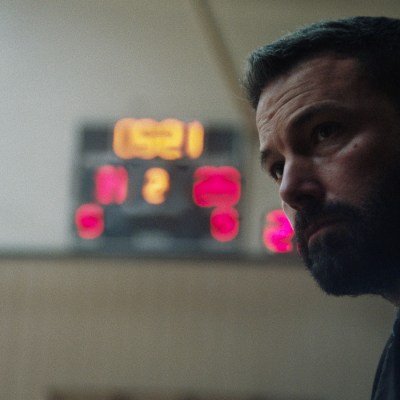First Cow Review
Kelly Reichardt’s First Cow might not be for everyone, but it's a journey worth taking.

There are few better metaphors for American capitalism than the faintly satirical (and deeply bittersweet) conflict at the heart of Kelly Reichardt’s First Cow. Ostensibly a story about friendship between Cookie (John Magaro) and King Lu (Orion Lee) in early 19th century Oregon territory, the title of the film actually refers to a prized bovine living near their rudimentary fort. Not that the cow belongs to the cook or the Chinese immigrant. Rather it’s the property of a gilded moneyman (Toby Jones). With affected airs of decidedly non-American origin, Jones oozes entitlement as he devours a cake made by Cookie and King—one honeyed in the literal dirt—oblivious that it could only exist because they stole milk from his well-bred beef, and willfully ignorant that glorified indentured servants can only get ahead by breaking rules he’s set against them.
It’s moments like this where the cleverness of Reichardt’s time warp to the past feels particularly sharp. It is also the kind of scene that makes up for the film’s overindulgent shortcomings. Because while First Cow offers a deceptively warm depiction of camaraderie and American ingenuity in its starkest terms, what should be a lean 90-minute story is burdened by a two-hour running time that spends far too many frames basking in its historic authenticity and painterly atmosphere. The result is a movie that’s emotionally poignant, even as those emotions feel curiously blunted.
Beyond an ominous (and spoiler-y) prologue, the film begins in earnest when we meet Cookie, a stoic and introverted fellow who has abandoned Boston in favor of managing a company’s meals on the Oregon trail. These fellows are among the first to make the trek west, even if Cookie appears far removed from the rugged aesthetic of his beaver-cap wearing brethren. He’s lucky then to bump into King one night in the woods. The latter is a Chinese immigrant who’s traveled the world and has come west for a new start. The two form an unlikely friendship by the time they reach their Oregon outpost and begin sharing buttermilk biscuit recipes.
These delicacies should be impossible to make in a fort that is as much still a product of the natural world as it is civilization. In fact, the only recognizable ingredients Cookie has to work with beyond beaver meat is flour and water. But he rectifies those limitations by paying nightly visits to their landowner’s cow for discreet buckets of milk. While this is risky, it’s not extremely so until King realizes that the only way the pair can climb out from the bottom is by selling dairy-based bread to the fort’s denizens.
Read more
It’s a simple conceit in which Reichardt and screenwriter Jonathan Raymond (working from his own novel) are able to offer a potent allegory about Western commerce and mobility at a time when the Old West was new. Beyond the snobbery of the outpost’s elite, there are striking differences between how the American and the American immigrant view this venture. For Cookie, Magaro registers a note of futility from the outset. When his friend calls this land new, Cookie responds that it seems very old to him—life is always the same thing on a different day. Yet King sees endless opportunity. A more cynical movie might suggest something manipulative, but Reichardt has produced one of her most affectionate films, one that revels in the power of companionship… sometimes to a diminishing degree.
The director takes a measured gait while setting up Cookie and King’s world, as well as the largely unspoken affinity that ultimately binds the two men. Each actor brings a naturalness to their performances, albeit the film works best when Lee dominates the frame with his more proactive and disarming demeanor.
But the film takes such pleasure in luxuriating in the harshness of their existence that the effect is more distancing than endearing. Her camera framing remains almost defiantly staid and devoid of movement for much of the film’s first hour, with the actual inciting incident of stealing the milk not occurring until the movie is halfway over. As a consequence, the picture is handsomely mounted, but even for this history nerd, somewhat uninvolving.
Nevertheless, the ending has stuck with me for days. The aforementioned prologue heavily implies the direction of the narrative, but the actual storytelling is never so clear cut or heavy-handed. Indeed, the ending is remarkably intelligent wherein the audience is given the tools to take from the plot what they will, and tap into an unspoken anxiety that reaches a fever-pitch before the closing credits. But miraculously, Reichardt’s emotional resonance stays squarely focused on the characterization above all else, and a beautiful portrait of fellowship. The effect makes the film, for whatever its faults, a genuine surprise. Hauntingly so. I cannot say the journey will be for everyone, but I am glad I took it.

